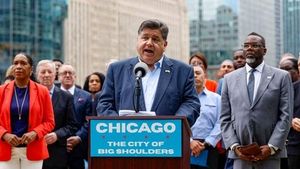Nagpur: Addressing the pressing healthcare challenges faced by remote and underprivileged tribal communities, experts from around the world gathered in Nagpur for the ‘FIST 2025' (Forum for Indigenous and Sustainable Tribal Health) international symposium. This significant three-day event was inaugurated by Goa's Chief Minister Dr. Pramod Sawant, who emphasized the urgent need for awareness and intervention in tribal healthcare.
"Tribal populations suffer from various diseases, and raising awareness about treatment options is absolutely key. Through this symposium, we aim to identify and implement solutions quickly. The discussions here will provide invaluable insights for the upliftment of tribal society," Dr. Sawant stated during the inaugural ceremony.
The symposium, organized collaboratively by the Maharashtra University of Health Sciences (MUHS) and the All India Institute of Medical Sciences (AIIMS) Nagpur, is being held from January 31 to February 2, 2025, bringing together global health experts, policymakers, and researchers to deliberate on significant tribal health issues and strategies to address them.
Among the distinguished officials present were Maharashtra's Tribal Development Minister, Prof. Ashok Uike, MUHS Vice-Chancellor Lt. Gen. Madhuri Kanitkar (Retd), AIIMS Nagpur Executive Director Dr. Prashant Joshi, and MUHS Registrar Dr. Rajendra Bangal. Prof. Uike stressed the importance of the recommendations stemming from the conference, particularly as they relate to the welfare of tribal populations.
Highlighting the geographical and demographic challenges, Prof. Uike pointed out, "13 districts in Maharashtra fall under the PESA (Panchayats Extension to Scheduled Areas) Act, covering 59 talukas. With 41 constituencies having significant tribal populations, it’s imperative we translate these discussions from the symposium directly to actionable policies. We will hold joint meetings with MUHS, AIIMS Nagpur, and the Tribal Development Department next month to explore these possibilities."
Meanwhile, Maharashtra Governor CP Radhakrishnan sent his best wishes to the symposium through a video message, commending the initiative as pivotal to resolving tribal health issues. Lt. Gen. Kanitkar discussed being proactive and innovative, stating, "This conference will consolidate knowledge to implement effective healthcare strategies. Raising awareness among tribal populations will undoubtedly lead to significant improvements."
Dr. Prashant Joshi elaborated on AIIMS Nagpur's concerted efforts to address severe health issues among tribal groups, particularly mentioning initiatives targeting sickle cell anemia and malnutrition. "Through our collaboration with MUHS and initiatives like MUHS FIST-25, we are devoted to strengthening healthcare policies to meet the specific needs of tribal communities," he explained.
The conference also featured insightful discussions led by various experts, focusing on direct health care statistics and needs assessment. Chief Secretary Sujata Saunik addressed the necessity for systematic research to unpack the root causes of health problems prevalent among tribal populations. "Health issues here are distinctly complex and require targeted dialogue and action. The MUHS FIST-25 conference will be pivotal for us to understand these problems comprehensively and find sustainable solutions," she stated.
Soon after, Saunik talked about the inadequacies of health information gathering from grassroots levels, which should align with WHO standards for effective intervention. "The health information we obtain, particularly from ASHA workers and field health workers, needs to be comprehensive. Through our direct healthcare initiatives, the data we amass must be equally thorough," she urged.
The symposium aims not just to exchange knowledge but also to devise practical measures for tackling the health disparities affecting tribal communities. The culmination of these discussions and insights will lead to recommendations for state and national health policies particularly targeting tribal welfare and healthcare enhancement.
Participatory efforts are the underpinning of this forum’s vision, as they strive to unite officials, researchers, and policymakers to directly tackle issues such as malnutrition and disease prevalence among tribal populations. Throughout the three-day symposium, experts will share their findings and successful strategies from different parts of the world, aiming to create frameworks adaptable to the tribal healthcare crises faced within Maharashtra.
According to the latest data discussed at the event, tribal communities are disproportionately affected by health issues, including high rates of malnutrition and genetic disorders like sickle cell anemia. This symposium is viewed as a timely intervention to generate awareness, share resources, and innovate solutions to these complex health conditions.
Dr. Sanjeev Chaudhary, the conference's convener, noted the importance of translating discussions and insights from the symposium directly to effective health policies. He expressed hopefulness about the outcomes of the gathering. "The recommendations derived will be compiled rigorously for both state and central policy implementation," he said, setting the stage for meaningful change.
With significant participation from experts and policymakers, the FIST 2025 symposium marks another step toward building much-needed healthcare frameworks for Maharashtra’s tribal populations. These collaborative efforts signal optimism for enhancing the living conditions and health standards of these underprivileged communities.



